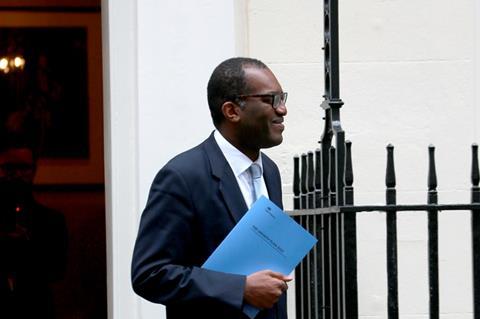Just £1bn new spending announced in mini-budget
Kwasi Kwarteng has been accused of missing an opportunity to invest in energy efficiency in the growth plan announced on Friday.
Energy efficiency went unmentioned in the chancellor’s fiscal statement but there were two measures buried in the detail of his announcement.
The government promised an extra £1bn for energy efficiency over three years as well as a renewed commitment to “imminently” bring forward £2.1bn in funding from previously announced schemes to support local authorities, housing associations, schools and hospitals invest in energy efficiency and renewable heating.

Building understand that the former will be funded through increases in the Energy Company Obligation levy, while the latter represents the next waves of three schemes – the Social Housing Decarbonisation Fund, the Home Upgrade Grant and the Public Sector Decarbonisation Scheme.
Cara Jenkinson, cities manager at climate solutions charity Ashden, said it was shocking that energy efficiency went unmentioned in the fiscal statement and described it as a “missed opportunity” to reduce dependency on gas, create jobs and cut carbon emissions.
“It is a shame that the Chancellor has not targeted stamp duty reductions for those who make their homes more energy efficient,” she said.
Building Research Establishment chief executive Gillian Charlesworth said she had been “disappointed” by the mini-budget, urging “long term solutions to the energy price crisis”.
Chris Friedler, policy manager at the Association for Decentralised Energy, said that while the re-iteration of support for retrofit was a “welcome boost”, the fiscal statement was a case of “the more you look the less there is”.
“If we were to treat this, like an actual budget, which, given the massive tax shake up, it is I think is fair, It is quite disappointing, he added.
> Also read: Kwarteng cuts stamp duty as he pledges to ”get Britain building”
He said that many in the industry had been hoping that for a so-called ‘Eco Plus’ policy, whereby energy levies are topped up by money from general taxation.
“What industry was asking for was for more money from general taxation, and the government appears to have done the opposite,” Friedler said.
“What they’re looking like they’re doing instead is they’re just getting more money from levies”.
Yesterday, RIBA president Simon Allford called Kwarteng’s interventions a “missed opportunity”. He said: “Whilst additional financial support for household energy bills will provide short-term relief, and new funding for energy efficiency improvements signals some progress, measures fall short of the National Retrofit Strategy we have been calling for.”
Turner & Townsend director Richard McWilliams was more positive, describing the announcement was a “signal of renewed commitment to retrofit”.
He added: “Reducing the public sector demand for energy must be a fundamental aspect of our energy security and resilience,” he said, adding that insulation measures offered a significant opportunity for job creation.
“What we need to see now is a shift in emphasis from a retrofit funding programme to a market transformation programme – delivering a self-sustaining market for retrofitting the UK’s buildings and ensuring that the sector and the supply chain rise to meet the scale and pace of the opportunity,” he said.
“Friday’s announcement gave us a clear and positive declaration of intent – but we will need to be strict in our scrutiny of the details when they are revealed.”
Kwarteng was energy minister at the Department of Business, Energy and Industrial Strategy, and later secretary of state at the department, during the rollout of the £2bn Green Homes Grant programme for household energy efficiency improvements.
The scheme, which was widely criticised for its chaotic implementation and poor administration, was scrapped in March 2021 after just six months. Kwarteng later admitted the rollout had been “problematic”.
















1 Readers' comment